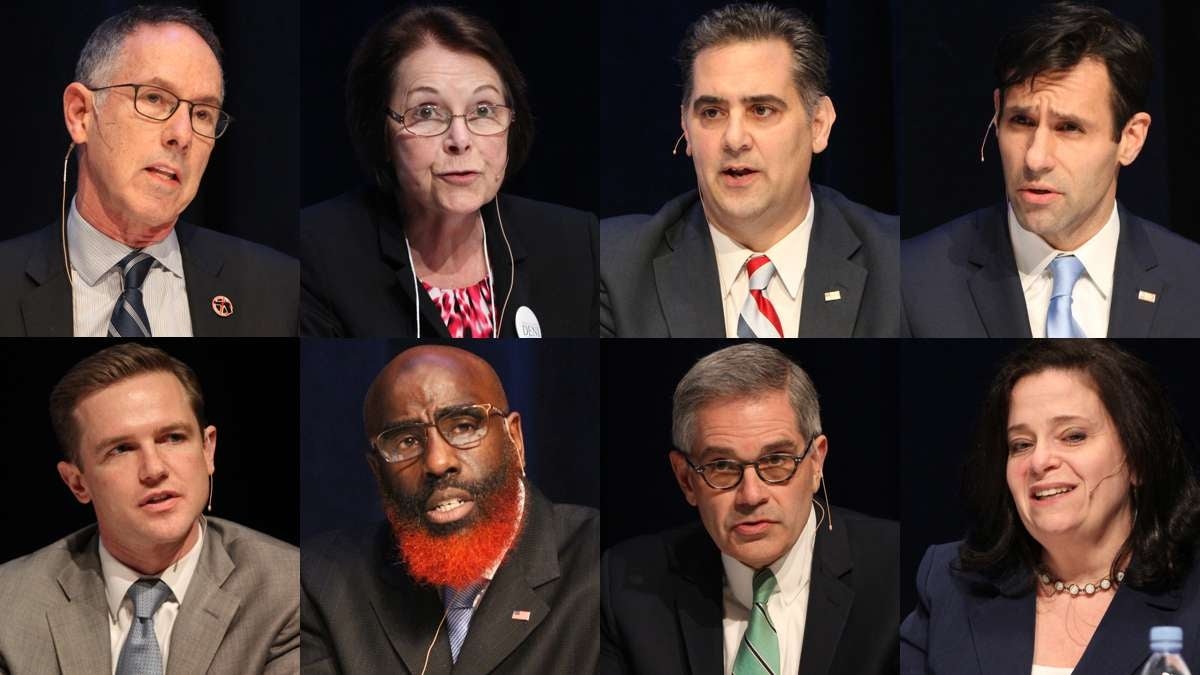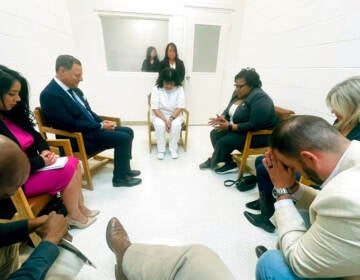Distinguishing among Philly DA candidates’ positions on the death penalty

Eight candidates for Philadelphia district attorney are shown at a candidate debate on March 23 (clockwise from top left) Michael Untermeyer, Teresa Carr Deni, Rich Negrin, Joe Khan, Beth Grossman, Larry Krasner, Tariq El-Shabazz, and Jack O'Neill, met for a debate at Springside Chestnut Hill Academy. (Emma Lee/WHYY)
On May 16, Philadelphians will effectively elect a new district attorney, and the candidates have different positions on an important issue: whether to pursue the death penalty.
Briefly, DAs have great discretion, and are “not required to seek the death penalty in first-degree murder cases.” Fulfilling a campaign promise, on Feb. 13, 2015, Gov. Tom Wolf issued a moratorium on executions in Pennsylvania, which amounts to a temporary suspension of the practice that is performed by the State Department of Corrections, not local DA offices. The moratorium has been upheld by the Pennsylvania Supreme Court.
Much has been written about the DA candidates’ statements on capital punishment, yet important distinctions have not been consistently highlighted, making it harder to discern shifting rhetoric. At times, coverage has been blatantly wrong, reporting that “All … are opponents of the death penalty.”
To be accurate, the candidates for Philadelphia DA have one of three positions on the death penalty:
Vow not to pursue it (highlighted in blue in the table below)
Support the current moratorium instituted by Wolf (highlighted in grey)
Suggest they will only use it in “extreme cases” (highlighted in red)
Into which of these three possible piles does each candidate fall? For some, it depends when you ask them. Using responses to Holly Otterbein’s Philadelphia Magazine interviews as a baseline, the table below shows the candidates’ positions when she interviewed them in February, and then as expressed at three public events on the campaign trail:
| Candidates (Party) | Philly Mag Interviews (Feb. 22 – March 14) | Philadelphia Bar Assoc. Forum (April 4) | #DecarcerateDA Forum (April 18) | NAACP / WHYY / WURD Candidate Forum (April 27) |
| Larry Krasner (D) | A | A | A | A |
| Tariq El-Shabazz (D) | B | A | A | A |
| Rich Negrin (D) | B | A | [not present due to illness] | B |
| Joe Khan (D) | C | B | C | C |
| Teresa Carr Deni (D) | C | C | C | C |
| John “Jack” O’Neill (D) | C | C | C | C |
| Michael Untermayer (D) | C | C | C | C |
| Beth Grossman (R) | C | C | C | C |
Clarifying three positions
Initially, only Krasner clearly opposed the death penalty, which he articulated when announcing his candidacy on Feb. 8, and on his website. By March 20, El-Shabazz and Negrin were voicing support for the moratorium, but they were not showing expicit opposition to the death penalty. The remaining five stated they’d pursue executions in “extreme cases,” a position they have generally maintained, with slight deviation by Khan.
As noted elsewhere, more DA candidates are now clear about opposing the death penalty than at the beginning of the race. By the end of April, El-Shabazz had joined Krasner in publicly stating on multiple occasions that he would not pursue the death penalty.
Negrin, who is clear about his support of the moratorium, has given at least two indications that he is explicitly against the death penalty: first, at the April 4 Philadelphia Bar Association Forum, and again on April 28, when journalist Chris Brennan tweeted that Negrin’s campaign had told him that “he will not pursue the death penalty as DA.” Brennan was seeking clarity following the NAACP/WHYY/WURD candidate forum the night before, when Negrin had only expressed support for the moratorium.
To be clear, there is a categorical difference between supporting one thing and opposing another: Supporting a moratorium that could effectively end with the gubernatorial election on Nov. 6, 2018, is fundamentally different from taking a firm and unequivocal stand against the most severe and irreversible form of punishment available.
According to a PolitiFact article from May 3, Negrin was the only Democratic candidate who did not respond to a request for comment regarding his position on the death penalty. As recently as May 4, Negrin told listeners at Mishkan Shalom, a synagogue in Roxborough-Manayunk, that he would “honor” the moratorium. If his position is equivalent to that of Krasner and El-Shabazz, Negrin could — and should — make public statements to that effect.
What it means to “support the moratorium” is dubious: On the one hand, death sentences can still be pursued by local DAs during a moratorium; on the other hand, candidates have no choice but to honor the statewide moratorium. Candidates expressing a willingness to support the moratorium are seemingly ready to punt this issue to Harrisburg and 2018, going along with the political winds. We don’t know how they would act in the absence of the current governor’s leadership, and deferring to the whim of Harrisburg allows the voters of suddenly-red Pennsylvania to determine the fates of overwhelmingly-blue Philadelphians.
Black and white
As for the other candidates asking you to trust their discretion in “extreme cases,” one of the most rigorous studies of the death penalty conducted by David Baldus and colleagues happens to have used data from Philadelphia. In summarizing its findings, the former executive director of the Death Penalty Information Center, Richard Dieter, Esq., noted that it was never restricted to “extreme cases.” Instead, it was pursued in cases where the evidence was less clear; in such cases, arbitrary extra-legal factors become more influential and “prosecutors and jurors have the most discretion on seeking and imposing the death penalty. And when discretion is more prevalent, race may more easily become the deciding factor in who lives and who dies.”
To date, prosecutors have not been selective in seeking the death penalty in Philadelphia. As a result, Philadelphians account for roughly 36 percent of Pennsylvania’s death row, and black men from Philadelphia — who represent less than 3 percent of the population of Pennsylvania — comprise 30 percent of those on Pennsylvania’s death row (53 of 173 as of March 1, 2017).
Alternatives to death include long-term and life sentences, and not seeking the death penalty would save the Office of the District Attorney resources that could be used to support other efforts, i.e., those candidates have been speaking about on the campaign trail. In effect, vowing to pursue the death penalty undercuts one’s ability to fulfill other campaign promises.
The good news for those opposed to the death penalty is that more candidates now seem to feel the same way. Some have been consistent in their position against the death penalty, and others have not. Voters supporting the abolition of capital punishment for Philadelphians, and reform more generally, must decide who is likeliest to implement this profound change to our criminal justice system, and what other issues they are most capable of addressing through moral conviction and demonstrated capacity to support opposition to the status quo.
Being anything but crystal clear about one’s position on the death penalty is problematic, and might reflect the potential for inconsistencies in less tendentious areas. Therefore, a comparative consideration of their statements over time should be relevant to the May 16 primary.
—
Oren M. Gur, PhD, is an assistant professor of criminal justice at Penn State Abington, where he co-taught a class called “Death Penalty and Juvenile Life Without Parole” this spring. His research on the death penalty has focused on its historical application to those who were young adults when they committed the crime for which they were executed in the U.S.
WHYY is your source for fact-based, in-depth journalism and information. As a nonprofit organization, we rely on financial support from readers like you. Please give today.




